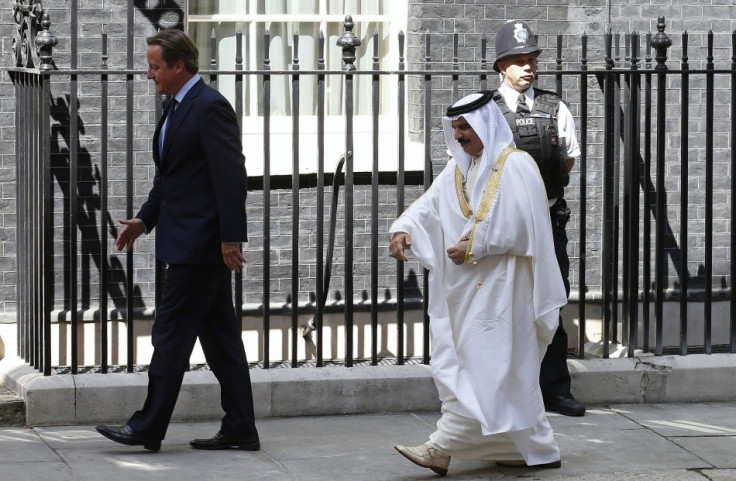Bahrain's Prince Nasser Could Lose Immunity in England and Wales over 'Torture' Allegations

The England and Wales public prosecution service is facing a judicial review over the immunity of Bahrain's Prince Nasser bin Hamad Al Khalifa, who has been accused of torturing detainees in April 2011.
A Bahraini citizen, known as FF in the proceedings, sought the arrest of the son of Bahrain's king following allegations that he was directly involved in the torture of three prisoners in Bahrain during the pro-democracy uprising, but was told that the prince would be immune from prosecution as a member of the Bahraini royal family.
FF, who claims he was badly beaten, injured by police and held without charge, wants to challenge the Crown Prosecution Service's immunity decision as "erroneous in law".
Lord Justice Laws explained in a 2013 ruling seen by IBTimes UK that the proceedings brought by FF, who was also arrested after the 2011 protests and has now been granted asylum in the UK, are not linked to what happened to him.
Instead, they pertain to "allegations that Prince Nasser bin Hamad al-Khalifa, the son of the King of Bahrain, was directly involved in the torture of three individuals in prison in Bahrain".
A dossier drafted by the European Centre for Constitutional and Human Rights (ECCHR) in Berlin and containing damning evidence regarding Prince Nasser was handed over in 2012 to the Director of Public Prosecutions.
The arrest and prosecution of the prince - a regular traveller to the UK - was sought on the basis of section 134 of the UK's Criminal Justice Act of 1988.
However the War Crimes team of the Met Police, which received the ECCHR dossier, stated that the Prince would enjoy immunity under the State Immunity Act 1978 as a member of the Bahraini royal family. The CPS confirmed the decision in August 2012.
A month later, a request for the review of that decision forced the CPS to maintain that Prince Nasser was not immune from prosecution because of his royal status - as his household was independent from the King of Bahrain - but he kept "functional immunity" as commander of the Royal Guard of Bahrain.
It is precisely this CPS decision that is challenged as "erroneous in law" by FF.
The proceedings could not be reported before because of a previous confidentiality order against naming Prince Nasser. A court order removed the restrictions last Friday.
Lord Justice Laws stated in 2013 that "in principle, as it seems to me, it is perfectly right that Prince Nasser's identity should not be concealed. These are, or will become, public proceedings.
"There is no basis in law or proper practice for concealing the identity of the defendant on grounds only that serious allegations are involved or that he enjoys a high position in a foreign State.
UPDATE: The Bahraini government has issued the following statement in reaction to IBT story:
"This case questions the technical legal grounds of an English prosecutorial decision. Bahrain is not a party to the case and therefore it would be inappropriate for it to comment. Suffice to say the Government of Bahrain has never sought from the British Court either anonymity or sovereign immunity for anyone in respect of this case. The Government simply refutes in the strongest possible terms the factual basis for the underlying allegations which it maintains are unfounded, false and politically motivated."
© Copyright IBTimes 2025. All rights reserved.






















